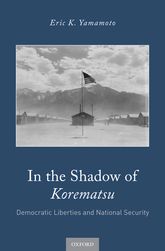
Eric K. Yamamoto, In the Shadow of Korematsu: Democratic Liberties and National Security. New York: Oxford University Press, 2018.
In his book, In the Shadow of Korematsu, Professor Yamamoto analyzes the legacy of Korematsu v. United States[i]. His critique is sobering.
Korematsu’s holding is troublesome if one believes that Constitutional rights are sacrosanct: The United State Supreme Court held that a U.S. citizen’s Constitutional rights can be abridged in times of war if it is deemed to be necessary to preserve national security. Executive Order 9066 authorized the collection and relocation of Japanese American citizens even though no one had committed any crime. The government pushed the narrative that Japanese Americans had an inherent loyalty to Japan, a loyalty stronger than their citizenship to the U.S., and that loyalty would pose a danger to everyone living on the west coast. That argument convinced the Court that national security was their prime concern, not racism, and successfully persuaded the Court that keeping the nation safe trumped the rights of citizens.
In retrospect, legal scholars, historians, law professors, and judges all acknowledge that in a blatant act of racism, the government exaggerated the dangers posed by citizens with Japanese ancestry to support the necessity of Executive Order 9066. Justice Jackson in his dissent pointed out, “But here is an attempt to make an otherwise innocent act a crime merely because this prisoner is the son of parents as to whom he had no choice, and belongs to a race from which there is no way to resign.[ii]” Justice Murphy, in a separate dissent, stated plainly, “Such exclusion goes over ‘the very brink of constitutional power,’ and falls into the ugly abyss of racism.[iii]”
The unfortunate legacy of Korematsu is that many have taken this case to mean that courts are likely to abridge civil rights protections in times of war. Professor Yamamoto points out throughout the book that many people since then have tried using fear as motivation to curtail the rights of minority groups and those with limited power to fight back. But this misapplication of the holding by the government and special interest groups is only one of Professor Yamamoto’s conclusions.
His second conclusion is that, when at war, the judiciary is loath to challenge actions taken by the other branches of government, and that this is one area where the courts intentionally do not assert their independence. Rather, it is the opposite: in times of war, the courts will defer to the expertise of the President and the Legislature. And he is not the only scholar to make this assertion. In 2014 Justice Antonin Scalia was asked if the government might relocate Muslims like they did Japanese Americans. He said,
Korematsu was wrong … But you are kidding yourself if you think the same thing won’t happen again … There was panic about the war and the invasion of the Pacific and whatnot. It was wrong, but I would not be surprised if it happened again in time of war.[iv]
In response to the question, what would the Court do today if faced with a similar situation, Justice Scalia answered, “inter arma enim silent legis,” or translated, “in times of war, the laws fall silent.”
Judge Richard Posner of the Seventh Circuit Court of Appeals, known for applying economic analysis in deciding the law, posits that in a cost-benefit analysis, the courts would likely lean towards supporting public safety over an individual’s rights. Professor Owen Fiss’s analysis of recent court cases, specifically Holder v. Humanitarian Law Project[v], supports the author’s conclusion that war, and for this case, specifically the war on terror, is the cause of judicial deference to the other branches of government.
To be fair, not all judges and not all government officials are this dismissive of our Constitutional rights. Many judges have taken pains to distinguish the circumstances that surrounded Korematsu from current cases, and they use a stricter standard of scrutiny to make sure that discrimination is not the result of government overreach. Perhaps this kind of careful examination is the first step in ensuring that Korematsu’s legacy of social injustice is not repeated.
[i] Korematsu v. United States, 323 U.S. 214 (1944).
[ii] Korematsu, at 243.
[iii] Korematsu, at 233.
[iv] Debra C. Weiss, Scalia: Korematsu was Wrong, but “You’re Kidding Yourself” if You Think It Won’t Happen Again,” ABA J. Feb 4, 2014, as cited in Eric K. Yamamoto, In the Shadow of Korematsu: Democratic Liberties and National Security. New York: Oxford University Press, 2018, p. 5.
[v] Holder v. Humanitarian Law Project, 561 U.S. 1 (2010).